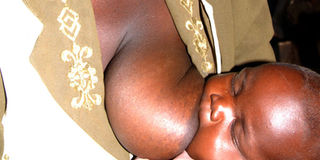Babies deprived of breast milk at birth risk dying

A mother breast-feeds her baby. Nutritionists say the best food for a baby below six months is breast milk.
File Photo
What you need to know:
- The national demographic health survey notes that whereas the country had achieved in increasing numbers of mothers who breastfeed, only 66 percent countrywide undertake exclusive breastfeeding in the first six months.
Busia. At least 135,000 newborns are at risk of death annually due to failure of their mothers to initiate breastfeeding within the first one hour of delivery, Dr Samali Namukose, the assistant commissioner of nutrition at the Ministry of Health, said.
“Introducing a newborn to breast milk within the first one hour after delivery gives chance for the baby to take the first thick sticky yellowish milk called colostrum, which cleans the baby’s abdominal systems; but at the same time it is a vaccine which helps step up the immune system against various diseases,” she said.
Failure to introduce newborns to breast milk denies them vital nutritious milk and an opportunity to have skin-to-skin contact with the mother, which leaves them at risk of exposure to various nutrition deficiency diseases and breathing-associated problems.
The national demographic health survey notes that whereas the country had achieved in increasing numbers of mothers who breastfeed, only 66 percent countrywide undertake exclusive breastfeeding in the first six months.
“As a country, our goal is to ensure that we have up to 100 percent breastfeeding for the first six months, and then mothers can begin introducing their babies to other [breast milk] supplements,” Dr Namukose added.
Busia, which last week held this year’s international breastfeeding celebrations at Masafu playgrounds, has one of the highest cases of teenage pregnancies, with statistics standing at 35 percent compared to the national average of 25 percent.
Dr Matthias Wabwire Panyako, the district health officer, said: “Every month, we have several cases of mothers who die during childbirth and those who abandon their newly-born babies. As a district, we are struggling to ensure that these babies are helped.”
Dr Wabwire also called for an urgent need to have a breast milk bank at the district.
Ms Stella Namukemo, a mother of four, said she was finding difficulty accessing enough food to help her undertake exclusive breastfeeding.
Ms Namukemo, who is a resident of Buyuya Village in Masafu Town Council, said being a working mother, she faced challenges of feeding on a balanced diet at her workplace.
Ms Mary Nabisere, a nutrition officer at United Nations Children’s Fund (Unicef), said there is need for various players to step up funding to increase information on breast feeding.
According to Unicef, globally about 77 million newborns are not fed on breastmilk in the first one hour of life, adding that delayed breastfeeding increases the risk of infant death up to 80 percent.




